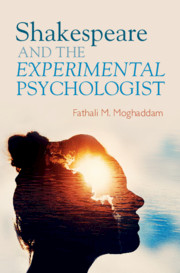Book contents
- Shakespeare and The Experimental Psychologist
- Shakespeare and The Experimental Psychologist
- Copyright page
- Dedication
- Contents
- Preface
- Acknowledgments
- Chapter 1 Introducing Shakespeare’s Psychological Thought Experiments
- Chapter 2 Experimental Research
- Part I Thought Experiments Involving Plays within Plays
- Part II Thought Experiments and the Power of Context
- Chapter 5 The Tempest
- Chapter 6 As You Like It
- Chapter 7 King Lear
- Chapter 8 Othello
- Chapter 9 Richard III
- Chapter 10 Macbeth
- Chapter 11 Julius Caesar
- Afterword
- Notes
- References
- Index
Afterword
from Part II - Thought Experiments and the Power of Context
Published online by Cambridge University Press: 10 June 2021
- Shakespeare and The Experimental Psychologist
- Shakespeare and The Experimental Psychologist
- Copyright page
- Dedication
- Contents
- Preface
- Acknowledgments
- Chapter 1 Introducing Shakespeare’s Psychological Thought Experiments
- Chapter 2 Experimental Research
- Part I Thought Experiments Involving Plays within Plays
- Part II Thought Experiments and the Power of Context
- Chapter 5 The Tempest
- Chapter 6 As You Like It
- Chapter 7 King Lear
- Chapter 8 Othello
- Chapter 9 Richard III
- Chapter 10 Macbeth
- Chapter 11 Julius Caesar
- Afterword
- Notes
- References
- Index
Summary
Shakespeare’s thought experiments are part of a revolution underway in scientific thinking during his era. Early examples of psychological thought experiments are found in Shakespeare’s plays. These thought experiments provide the fertile soil from which there eventually grew twenty-first-century experimental psychology. Although the power of context is highlighted in Shakespeare’s thought experiments, so is intentionality and some measure of free will. The underlying assumption is that not all behavior is causally determined, as is mistakenly assumed in mainstream psychology. Reflecting on Shakespeare’s thought experiments, clearly psychological science needs to accept that much behavior is normatively regulated, not causally determined. But Shakespeare’s writings were also integral to broader changes in the worldview and critical thinking that nourished transfomations toward actualized democracy. By highlighting and celebrating the central role of thought experiments in science and art, we can construct a bridge that helps end the huge gap that has opened up between science and art in our time.
- Type
- Chapter
- Information
- Shakespeare and the Experimental Psychologist , pp. 186 - 193Publisher: Cambridge University PressPrint publication year: 2021



